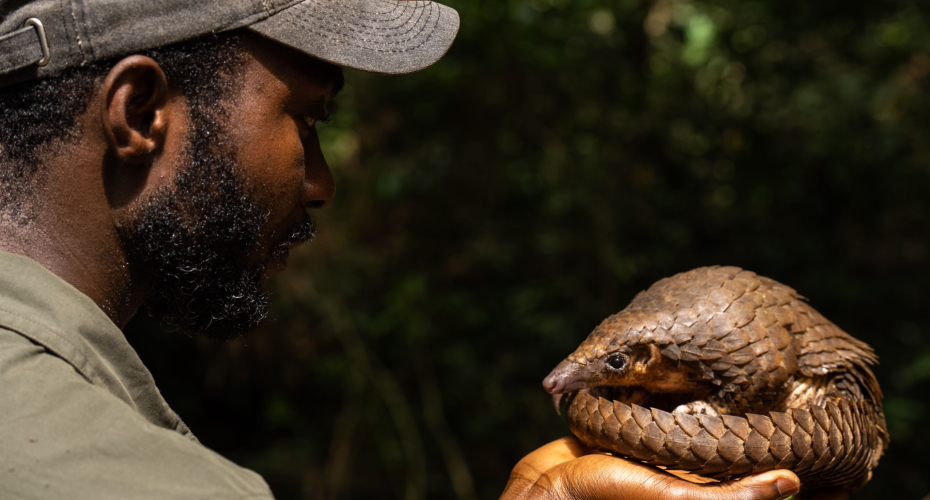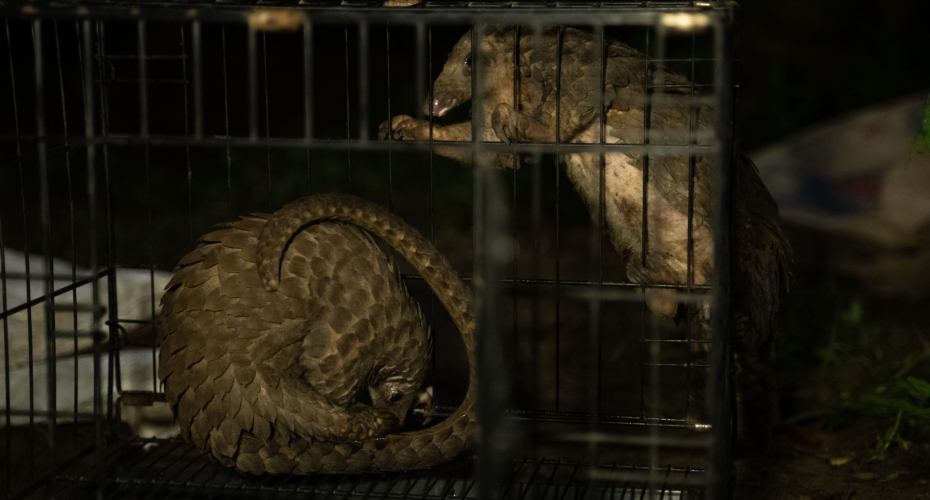New research finds pangolins in Africa hunted for food rather than illicit scales trade

Charles Emogor holding a white-bellied pangolin retrieved from a hunter who participated in the study. Credit: Alex Moore
One of the world’s most endangered mammals is being hunted in West Africa for the quality of its bushmeat and not the value of its scales to illegal Asian markets.
It has long been assumed that the pangolin’s keratin scales, prized in Chinese medicine, drives the hunting and criminal trafficking of the animal in Nigeria.
But now new research, led by the University of Cambridge with partners including the University of Exeter, has found that 98% of Nigerian pangolins are caught and consumed by people in the region. Published in Nature Ecology & Evolution, the study also reveals that two-thirds of the scales are simply thrown away.
All eight existing species of the cat-sized, insect-eating pangolin are threatened with extinction and on the IUCN’s Red List, with three Asian species categorised as critically endangered.
As Asian pangolins have declined dramatically, Nigeria has seen a boom in the export of pangolin scales to Asia. While hunting pangolins is illegal in Nigeria, it has become the world’s largest hub for the criminal trade in pangolin products.
“Thousands of kilos of pangolin scales are seized at Nigeria’s ports, creating the impression that the international demand for scales is behind pangolin exploitation in West Africa,” said study lead author and Gates Cambridge Scholar Dr Charles Emogor, who conducted the research for his PhD at Cambridge’s Department of Zoology. “When we spoke to hunters and traders on the ground around the Cross River forest, the largest stronghold for Nigeria’s pangolins, it was obvious that meat was the motivation for almost all of the pangolin killings.”
The research team, which included Dr Ben Balmford at Exeter, collected data from more than 800 hunters and traders in 33 locations across Nigeria’s Cross River Forest region, primarily between 2020 and 2023. During this time, conservationists estimate that around 21,000 pangolins were killed annually in the area.
Almost all pangolins were captured “opportunistically” or during general hunting trips (97%) rather than sought out, and they were caught primarily for meat (98%). Around 71% of pangolins were consumed by hunters themselves, with 27% traded locally as food.
Perhaps surprisingly, given their potential overseas value, around 70% of the scales were discarded, while less than 30% were sold on. However, researchers calculated that, per animal, pangolin meat fetched 3-4 times the price of scales at local Nigerian markets.

“We found that dedicated pangolin hunts are virtually non-existent,” said Dr Emogor, now a Schmidt Science Fellow split between Cambridge and Harvard. “Most pangolins are killed by hunters out for any type of game, and around a third are caught opportunistically, often while people are working in the fields. Pangolins curl into a ball when threatened, which sadly makes them easy to catch.”
Pangolin meat is a delicacy in parts of Nigeria, often procured for pregnant women in the belief it helps produce strong babies. The researchers surveyed hunters and Cross River locals on “palatability”, asking them to rank the tastiness of almost a hundred different animals eaten in the region, from domestic beef and chicken to catfish, monkeys and antelope.
The three major African pangolin species were rated as the most palatable of all available meats, with average scores of almost nine out of ten, and the giant pangolin considered the topmost appetising meat in the region.
While the study focused on Nigeria, the team says their pangolin hunting and consumption data echo that from countries such as Cameroon and Gabon – suggesting these patterns may be Africa-wide. But they add that the cost of policy interventions to tackle meat-driven pangolin trading might be cheaper than those for an international scales market, and potential remedies could include anti-poaching patrols as well as community programmes focused on food security.
“Tackling the decimation of pangolin populations requires understanding why pangolins are hunted in the first place,” said Dr Balmford, a Lecturer in Economics in the Exeter Business School, and member of the Land, Environment, Economics and Policy Institute. “We show, that at least in this region of West Africa, meat rather than scales is the primary motive, such that interventions which only address international trade may have limited success in halting the decline of pangolins.”
Pangolin hunting in southeast Nigeria is motivated more by local meat consumption than international demand for scales is published in the latest edition of Nature Ecology & Evolution, and included researchers from the Wildlife Conservation Society, Pangolin Protection Network, University of Washington, CIFOR, CARE International, and the universities of Oxford and Kent.



